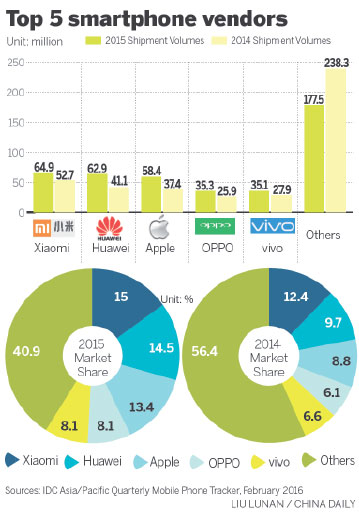Xiaomi to drop web-only sales
Updated: 2016-02-26 08:59
By Gao Yuan(China Daily Europe)
|
|||||||||
China's smartphone market leader to open 300 retail stores to counter challengers after using low-cost Internet model to rise to the top
Smartphone maker Xiaomi Corp debuted its flagship handset on Feb 24 and pledged to open up to 300 retail stores to counter Huawei Technologies Co Ltd, which is threatening its leading position in China.
Lei Jun, CEO and co-founder of Beijing-based Xiaomi, says the new device and offline sales plan will show challengers who is the boss in the market.
"We are sorry other vendors were left disappointed," Lei said at the launch event, mocking Huawei's 2015 plan to jump over Xiaomi in the Chinese market by year-end. Xiaomi shipped 2 million devices more than Huawei did last year, according to research firm International Data Corp.
"We are rolling out more top-tier products to secure the No 1 place," Lei says.
The company will rely on the new Mi 5 handset to achieve the target. The 5-inch-screen handset comes with a 16-megapixel camera on the back, a fingerprint sensor, a ceramic back, a powerful processor and 128 gigabytes of storage.
Its retail prices were set from 1,999 yuan ($306 to $413; 277 to 375 euros) to 2,699 yuan, depending on the configurations. By comparison, Huawei's slightly bigger flagship, Mate 8, is selling from 3,199 yuan, with storage and processing power similar to Mi 5's cheapest option.
The Mi 5 will be available on the Chinese mainland on March 1, followed by India, according to Xiaomi. However, the product will not be available in the United States market, although 5-year-old Xiaomi launched an online store in the US selling power banks and mobile accessories.
The delayed US release was largely due to the lack of necessary patents. Lei said at the launch event the company is growing its patent pool and has applied for about 3,600 patents in recent years.
China, the world's biggest smartphone market, will remain the top priority for Xiaomi in coming years, the company says. Lei says it will open 200 to 300 retail stores in Chinese cities to boost sales.
Nicole Peng, director of consultancy Canalys China, says going offline was a huge strategic change for Xiaomi as the company aims to grow sales while the market goes weaker.
Most Xiaomi devices are sold online. Internet-only sales have helped Xiaomi keep its operational costs low. The decision was made as demand for smartphones in the country stopped growing because of the high penetration rate.
A number of vendors are also mulling over more stores in smaller cities to boost sales.
Apple Inc is heavily dependent on the Chinese market. The company is aiming to have around 40 brick-and-mortar stores in the country. New outlets mainly target buyers in smaller cities such as Qingdao in Shandong province.
Tay Xiaohan, an analyst from International Data Corp, says the market has changed significantly since telecom carriers are reducing smartphone subsidies.
"Xiaomi entered the market at a time when the China smartphone market was still growing, and was able to capture a significant market share with its disruptive sales model," Tay says.
gaoyuan@chinadaily.com.cn

Today's Top News
Points of view
Small island makes a big difference
Rubio, Cruz gang up on Trump in debate ploy
'Invented-in-China’ products to the fore at MWC
Beijing edges NYC as home to most billionaires
110,000 refugees, migrants reach EU by sea in 2016
Tech giants reveal 5G innovations in Barcelona
Mechanism to be built to monitor ceasefire in Syria
Hot Topics
Lunar probe , China growth forecasts, Emission rules get tougher, China seen through 'colored lens', International board,
Editor's Picks

|

|

|

|

|

|






